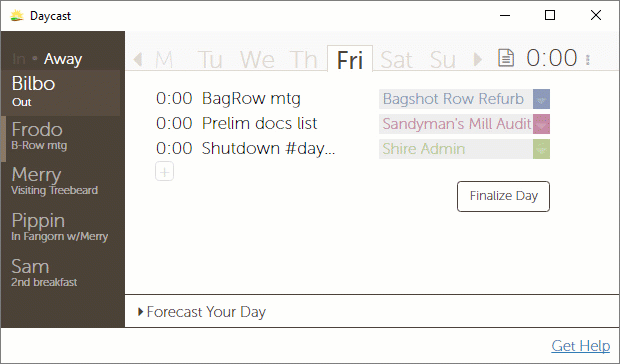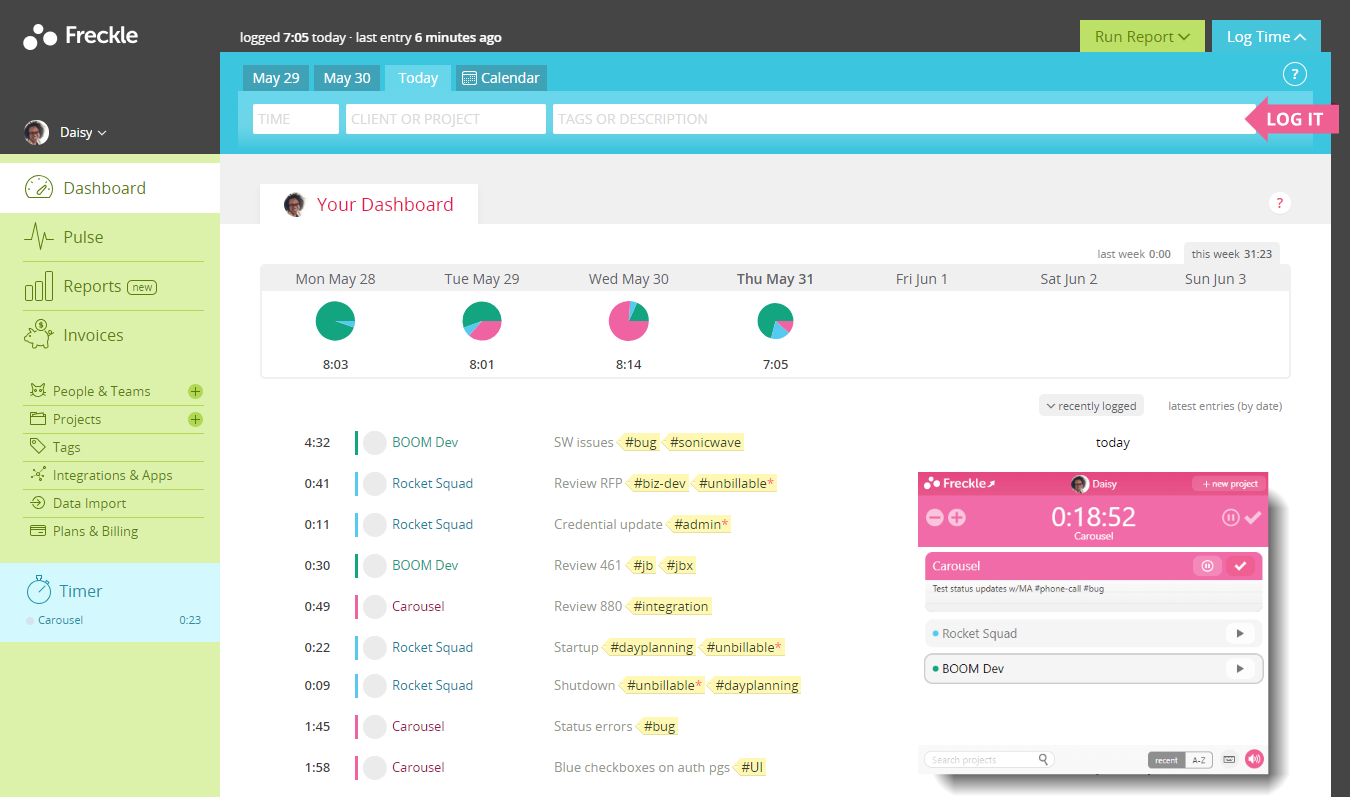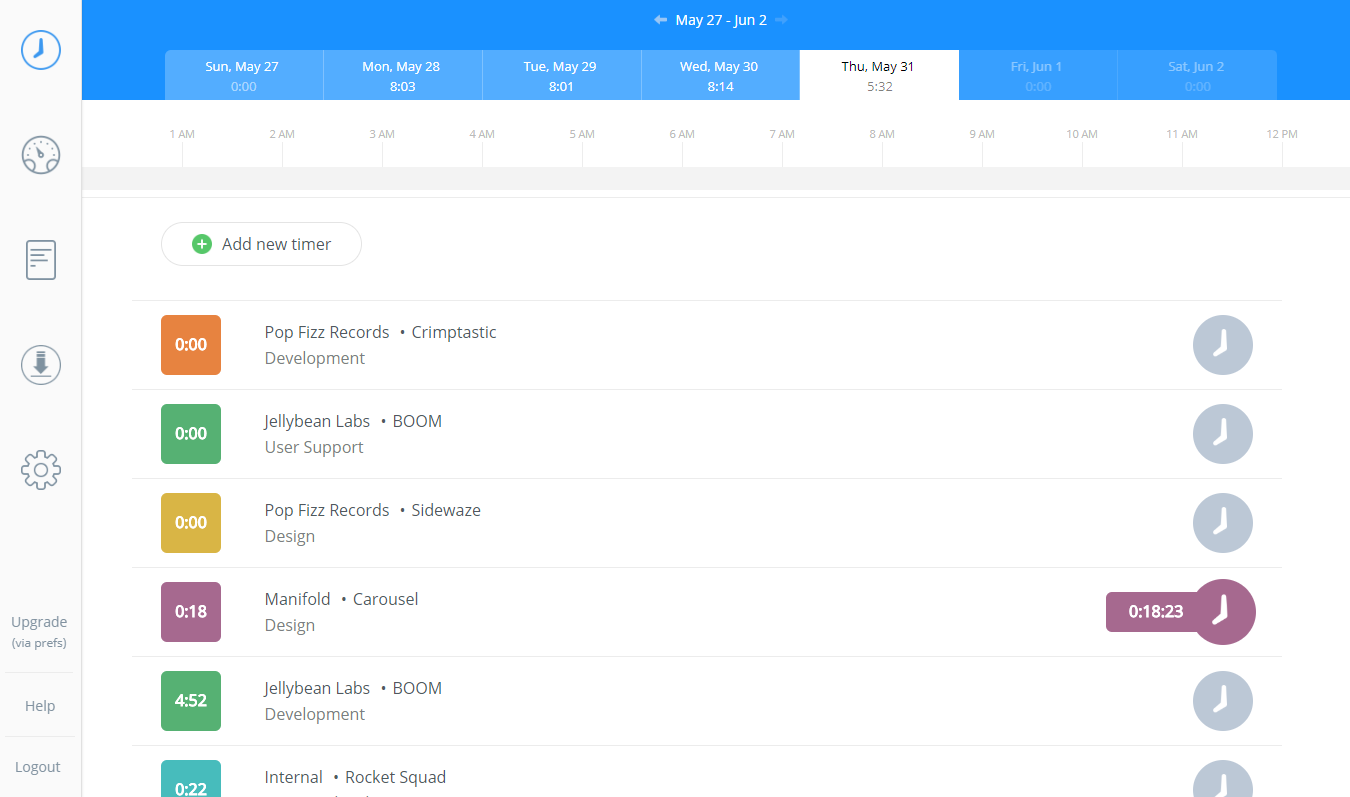We test-drove these time trackers. Here's what we learned.
/Updated 9/26/19: Since the publication of this article, one of the time trackers we reviewed—Freckle—rebranded to become Noko. As far as we can tell, the name is the only thing about the app that changed, so we’ve left our review largely as is, updating the links and name only.
As the makers of a time-tracking (and day-planning and team transparency) application, we work to stay informed of other time trackers on the market. We try them out, drawing inspiration from the things we like and learning from the things we don’t. In doing so, we can’t help but identify a few favorites.
In order, here are our current top four picks along with details about what makes them stand out, why we don’t use them (there’s a reason we built a time tracker, after all), and how Daycast stacks up next to each—see a features comparison chart here.
1. Timely
If we had to pick a winner, it’d be Timely. In our travels so far, we’ve only found two time trackers other than Daycast that allow users to make specific plans about how they hope to spend their time before actually spending it—a feature that, to us, seems pretty important if effective time management is one of your priorities. If you’re not planning your time, how do you work toward greater productivity and incremental goal completion? If you are planning how you use your time but must do so separate from the tracking of it, then time tracking becomes a chore, a necessary evil. A focus-breaker. Better to plan and track in the same place, we say.
Timely agrees.
2. Noko
Noko (previously Freckle) bills itself as “friendly online time tracking software,” and friendly it is.
High usability:
With an attractive, well-organized interface and the ability to start tracking time right away—no in-depth initial setup required—this web app makes diving in and learning the ropes easy. Which isn’t to suggest that Noko offers a cookie-cutter, non-customizable experience. On the contrary, users can configure everything from their preferred time and date format to user permissions to billing increments. All of which is painless to do thanks to Noko’s commitment to the idea that good software shouldn’t hurt.
“Good software is like a good concierge: there when you need it, with what you need in hand, fading away magically into the background when you don’t need it.”
3. Harvest
There’s a lot to configure with Harvest, which can give new users the impression that they’re in for a complicated ride. Not so. Despite the somewhat daunting length of their getting started webinar (who wants to spend half an hour learning how to use a time tracker?), Harvest is easy to learn and easy to use. And for the administrators among us, it’s probably a hands-down winner.
4. Hours Pro
One quick beef before we get into why Hours made the list: Nowhere on the Hours site is any information about pricing, integrations, or support. You have to sign up for an account to learn that:
The iPhone app is free, but it’s limited if you choose not to upgrade to a paid account.
There’s only one paid plan, and at $8 per user per month, it’s more reasonable than a lot of other team time-tracking software.
Hours offers no integrations. It used to integrate with FreshBooks Classic, and legacy users of that integration are still able to access it, according to Hours support. However, we could find no way for new Hours users to integrate with FreshBooks Classic.
Despite the frustrating lack of upfront information, Hours won the last spot among our favorites. Here’s why.
Honorable Mentions:
There are a couple of time trackers that we want to like but that just don’t make the cut for us:
TimeCamp is a web application with optional desktop and mobile phone apps. It’s the only other time tracker we’ve found that allows users to freely and easily plan their days ahead of time. And at $7 per user per month, it’s also affordable. The web version is a breeze, but the desktop apps are maddeningly difficult to use (not to mention uninstall), and the software tracks everything you do. While worthwhile to some, we’re leery of apps that record and deliver our movements to a third party.
TSheets is a full-service time-tracking system that seems like it’s a perfect solution for certain types of companies (e.g. construction, landscaping, janitorial, site maintenance, HVAC installers) and ideal for still others to replace time clocks (e.g. retail, restaurant, hotel). But it’d be cumbersome and rigid for Daycast’s users: knowledge workers who need to effectively plan and manage their time themselves.
The best time tracker is the one you'll use.
Philosophies and features aside, software that you dread using or forget to use hasn’t earned its place in your toolset. Some of that comes down to personal preference. Which is why we strongly recommend test-driving at least a few different time trackers before making any buying decisions. Most offer free trials ranging anywhere from seven days to Daycast’s thirty. Take full advantage of whatever trial period you’re offered, we say. Put the software through its paces. It may boast great reviews and gorgeous product shots but if it doesn’t sync up with your culture or compliment your team’s working style, it’s not a good fit. We know that trying out time trackers is not the most fun thing to do, but it’s the only way to answer the most important question: Will you use it?
Top photo by Hans Eiskonen




















Humans have been tracking and measuring time for millennia. Time tracking software, on the other hand, is a relatively recent development. Here we cover common types of time tracking software, their uses, common features, and how this modern way of timekeeping can benefit you.